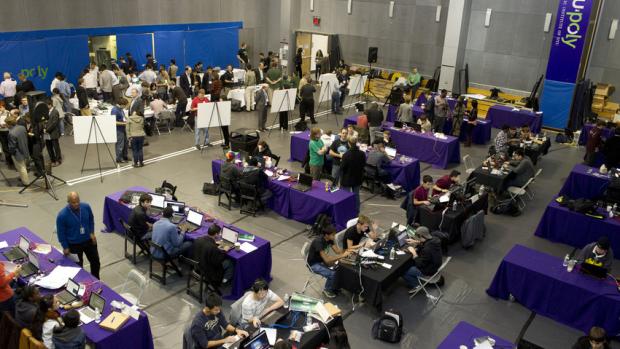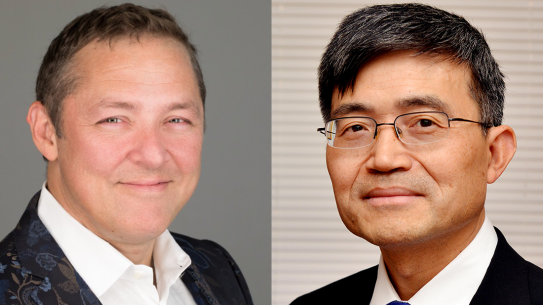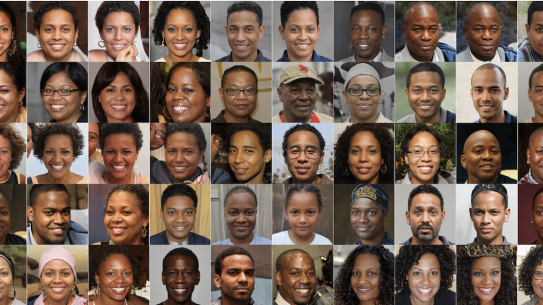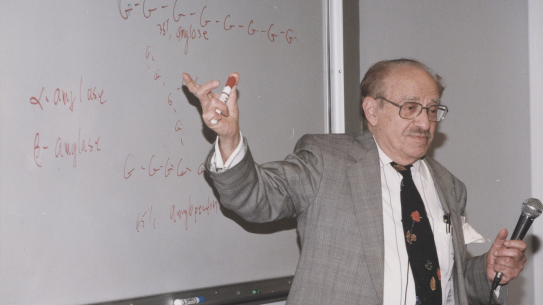NYU-Poly Cyber Security Judges Tap Top Student Teams in Hardware Hacking and Protection
11 International Collegiate Teams Progress to Final Round of Cyber Security Awareness Week; Their Emerging Field Protects the Trustworthiness of Electronics Manufacturing

Brooklyn, New York—Eleven international collegiate teams have been chosen to compete in the final round of contests that will challenge their knowledge in one of the newest and most difficult fields within cyber security: testing and protecting electronic hardware. The teams will progress to the finals of the largest student events of its kind: Polytechnic Institute of New York University’s (NYU-Poly) Cyber Security Awareness Week (CSAW), to be held on the school’s Brooklyn campus November 14-16, 2013.
Interest in the field of trustworthy hardware and embedded systems is skyrocketing, as evidenced by the nearly 40 percent growth in entrants for the NYU-Poly CSAW Embedded Systems Security Contest this year.
Last year’s top-placing schools—the University of South Florida and France’s Grenoble INP – Esisar—will return to defend their positions. Two other schools—Iowa State University and the University of Connecticut—fielded single contestants for the notoriously difficult competition.
Professor Simha Sethumadhavan’s research team from Columbia University offered the team’s defense for the hack by other teams. Like all CSAW contests, the Embedded Systems Security Challenge is organized by students, with mentoring and judging by academics and security professionals.
The winning Embedded Systems Security Contest teams that will compete in the CSAW finals are:
- Team Nighthawk, University of Texas at Dallas—Tianyu Chen and Liwei Zhou; mentor: Professor Y. Makris
- Iowa State Cyclones, Iowa State University—Matthew Hinrichsen; mentor: Professor J. Zambreno
- UCF Knights, University of Central Florida—Dean Sullivan, Ryan Dixon, Victor Medina, Brandon Frazer, Jeff Biggers, Henry Chan, and Jimmy Lee; mentor: Professor Yier Jin
- NYUAD attackers—NYU Abu Dhabi—Samah Mohamed Ahmed Saeed, Muhammad Yasin, and Chandrakumar Holenarasipursuresh; mentor: Professor Sinanoglu
- Intruders, University of Connecticut—Kan Xiao; mentor: Professor M. Tehranipoor
- Team Nanoscape Trojan, Case Western Reserve University—Yu Zheng and Abhishek Basak; mentor: Professor S. Bhunia
- Team Esisar, Grenoble INP – Esisar, France—Riff David, Conti Raphael, Zeroual Mouad, Coffe Jean-Charles, and Roux Baptiste; mentor: Professor D Hely
- Ninja Tyler Trojans, The University of Texas at Tyler—Mukesh Reddy Rudra, Varun Nagoorkar, Lagadapati Yamuna Sri, Lakshman Raut, Rajeshwar Rao Pinninti, Vrunda Tony Chitavaduta, Elizabeth Minu Joseph, Shyam Sai Prashanth Haran, Nimmy Anna Daniel, Mani Kumar Bikkumalla, and Dinesh Veeramachaneni; mentor Professor D. Hoe
- MoMA Avengers, NYU-Poly—Nektarios Georgios Tsoutsos and Charalambos Konstantinou; mentor. Professor M. Maniatakos
- Team NarMOS, University of South Florida—Matthew Lewandowski, Christopher Bell and James Muldoon; mentor: Professor S. Katkoori
- Team UTSA, University of Texas at San Antonio—Milad Maleki and Juan Portillo; mentor: Professor B. Li
All the attacks and defenses will be shared with other researchers on a National Science Foundation-funded computing research infrastructure called Trust-Hub, which was co-founded by NYU-Poly.
The best work from this year's Embedded Systems Security Contest will be presented as part of the new Hardware and Embedded Systems Security Track at the prestigious Design Automation Conference (DAC) sponsored by the Association for Computing Machinery (ACM), the Institute of Electrical and Electronics Engineers (IEEE) and the Electronic Design Automation Consortium and supported by the ACM Special Interest Group on Design Automation. The DAC will be held in San Francisco June 1-5, 2014, and is recognized as the top conference for the VLSI and Embedded Systems design community; VLSI, for very large scale integration, refers to the process of packing thousands of transistors together to make an integrated circuit such as a microprocessor.
The three-day CSAW finals will draw hundreds of the world’s most promising cyber security students and leading practitioners to NYU-Poly’s campus. In addition to the Embedded Systems Security Contest, other contests include a competition to find the best published student cyber security research including in hardware and embedded systems security; the Capture the Flag Applications Security Contest, which attracted a record 13,500 participants in the preliminary round; the High School Forensics Competition, a digital murder-mystery; the Department of Homeland Security (DHS) Security Quiz, a trivia game open to all students during the CSAW finals; and a contest in which students design interactive web experiences to emphasize the importance of cyber security awareness. The THREADS security conference will open the CSAW events and bring to campus top cyber security researchers to explain measures they developed for the U.S. Defense Advanced Research Projects Agency (DARPA). It is open to students and professionals. All cyber security students in the region are invited to participate in a career fair that is also part of CSAW.
For more information about NYU-Poly’s CSAW, visit https://csaw.isis.poly.edu/.
NYU-Poly was one of the first universities to introduce a cyber security program, and is designated as both a Center of Academic Excellence in Information Assurance Education and a Center of Academic Excellence in Research by the National Security Agency. The Sloan Consortium, an affiliation of educators and institutions dedicated to quality online education, named NYU-Poly’s virtual graduate cyber security program the Outstanding Online Program of 2011. The Center for Interdisciplinary Studies in Security and Privacy (CRISSP), a cutting-edge research collaboration of NYU-Poly and other NYU schools, re-examines the entire cyber security paradigm to integrate technology with broader issues such as human psychology, business, public policies and law. NYU-Poly’s Information Systems and Security Laboratory (ISIS Lab) hosts CSAW.
The U.S. Department of Homeland Security is a gold sponsor of CSAW, and Facebook and Qualcomm provide support at the bronze level. To date, 22 companies have provided generous funding for the educational goals of NYU-Poly’s CSAW.





